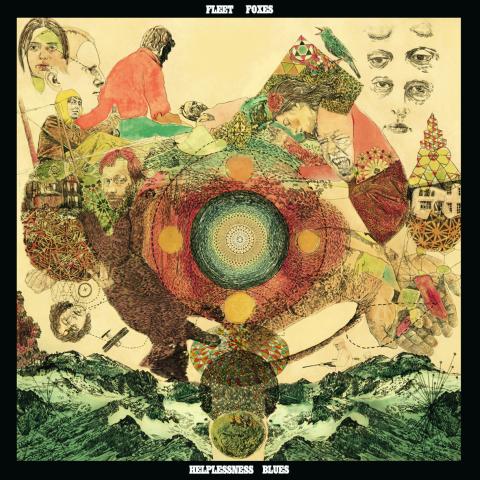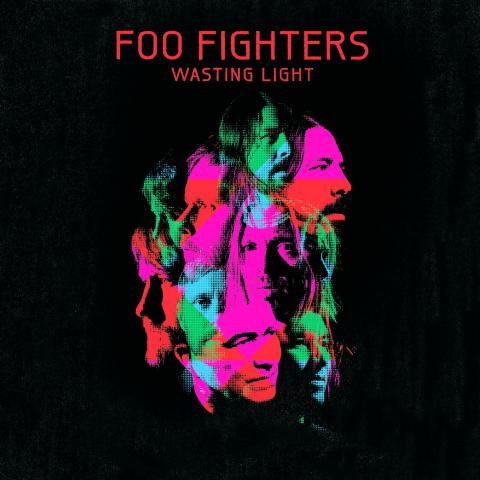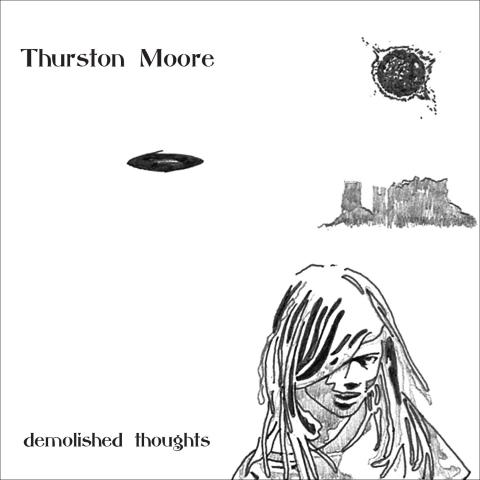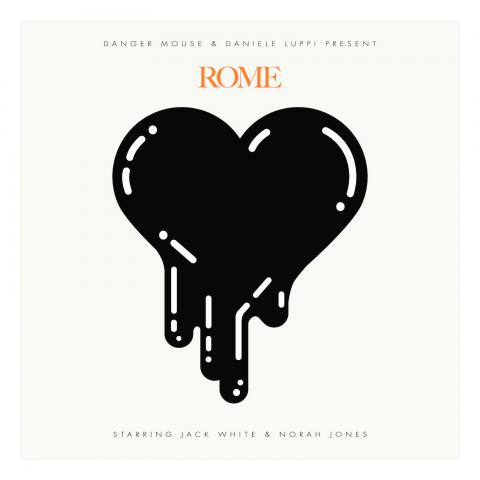Even before they signed with a label, the Fleet Foxes were already generating a huge buzz on MySpace.com, where their songs drew more than 250,000 plays. Independent music champion Sub Pop records took note and it wasn’t long before the band was off and running with its well-received full-length eponymous debut. On Helplessness Blues, the Foxes’ second album, the group stretches the boundaries of its songwriting while staying true to its original sound.
Front man Robin Pecknold cited Van Morrison’s Astral Weeks as an influence on the recording of Helplessness Blues and certainly something of the charm and immediacy of that record can be felt here. The basic sound and instrumentation is consistent throughout, yet each song finds special ways to surprise. Above it all sit Pecknold’s haunting vocals, delivered as though he is singing to you in the same room, intimating dark secrets below which insistent rhythms act as a sort of cohesive glue.
The songs on Helplessness Blues so clearly belong together that it seems a shame to single any out as better than the others. The single Sim Sala Bim opens with a delicate, finger-picked passage before anxious strings strike a nerve and the song erupts in a chorus of wonder: “What makes me love you despite the reservations?” A Led Zeppelin Bron Yr Stomp-style kick drum enters at the end, and the band closes the track with what can best be described as an exorcism by guitar and mandolin.

The title track is a beautifully penned ode to finding purpose in life, and although it treads on familiar, angsty ground, it nonetheless manages to present itself in a way that is fully palatable. Pecknold bangs away at his guitar and belts out the words, “I was raised up believing I was somehow unique … but after some thinking I’d say I’d rather be/a functioning cog in some great machinery/serving something beyond me.”
Helplessness Blues is the kind of album that many bands are only capable of producing once. One wonders if the Fleet Foxes will ever be able to top it.
As the drummer of Nirvana and the front man for the Foo Fighters, Dave Grohl has enjoyed a startlingly successful rock ’n’ roll career spanning over two decades. Wasting Light, the Foo Fighters’ latest release, is Grohl’s chance to reflect on what he’s done.

The trip down memory lane includes several familiar faces. Butch Vig, producer of the Nirvana classic Nevermind, is back behind the soundboard, and former Nirvana bassist Krist Novoselic guests on one of the album’s tracks. Wasting Light also marks the formal return of guitarist Pat Smear, who in addition to late-1990s work with the Foo Fighters also played with Nirvana on its final tour.
Bridge Burning begins the album with an absolutely ferocious riff and a whole lot of promise, but the monster quickly fizzes out with a limp chorus that lacks both power and melody. Such is the way with most of the record: Many songs show flashes of greatness but wind up bogged down by equally numerous moments of filler.
Another example of a good song gone wrong is the single Rope. Built upon a powerful, stabby guitar rhythm, its chorus sounds more like an afterthought than a climax, polished to a lifeless shine by Vig. The bridge’s wah-wah guitar wankery propels it even further down the path of lost causes.

Wasting Light isn’t terrible and in places it certainly rocks hard, but it offers little that we haven’t heard countless times before from Grohl and his band — only before they seemed to do it better.
Thurston Moore is a busy man. Known primarily for his work in the seminal noise-rock band Sonic Youth, he’s nonetheless been dipping his hand in myriad sonic cookie jars for quite some time. The musicians and artists he’s officially collaborated with now number in the dozens, and even the most die-hard of fans would be hard-pressed to track down copies of all of the work he’s released. Demolished Thoughts, produced by Beck, is Moore’s fourth solo LP, and is a bit of a departure for him.
“Thurston Moore” and “acoustic” do not, at first glance, seem to belong in the same sentence. But the man is now in his 50s, and although he’s not lost his fondness for impromptu noise jams, he does seem keener to explore softer sound textures.

January’s icy melodies pair well with Moore’s melancholic whisper, and tasteful string arrangements offer subtle accents. It’s definitely one of the album’s standout tracks, and proof positive that Moore can be at home in a world of harps and strings.
Still, don’t expect weepy coffeehouse folk. Moore tunes his acoustic guitars the same way he tunes his electric ones: oddly. Unexpected notes freely flit here and there, creating quirky melodies that are distinctly Moore.
And even while armed with only an acoustic guitar, he is able to conjure up surprising power. Circulation opens with angry, propulsive, dissonant chords, atop which Moore drops some of his trademark beatnik-style lyrics: “Perfect lights are backward refracted cries.”
Demolished Thoughts is a well-crafted record and an opportunity to hear Moore’s songwriting skills framed within a more traditional, acoustic context for the duration of an entire album — something that is a rarity even in his immense catalog. Both sensitive and spiraling, it warrants a listen from anyone who likes their folk a little raw around the edges.
Is there anyone in music today with as much cool-cred as Danger Mouse? From his relatively humble beginnings as a college radio DJ mixing Neutral Milk Hotel recordings in Georgia to his meteoric rise to Internet fame following the release of the Grey Album (a mix of Jay-Z’s Black Album with the Beatles White Album), to his work as a producer for the Gorillaz and his collaboration with Cee-Lo as Gnarls Barkley, Danger Mouse (aka Brian Burton) has found himself doing the right thing at the right time, again and again.
For his latest project he paired up with Italian film scorer Daniele Luppi in a tribute to Italian film called Rome.
He’s brought a lot of star power with him, too: Jack White and Norah Jones each sit in on several tracks as guest vocalists.
Album opener Theme of “Rome” sets the tone with ominous drums, humming vocals, tense strings and sparse guitar chords, immediately calling to mind visions of spaghetti westerns. Jack White then enters, stage right, on The Rose With the Broken Neck.
The song’s lovely, lilting keys couple nicely with White’s double-tracked vocals and melodramatic lyrics: “Lonely, I see/Lonely, I need/Lonely, I feel/And lonely, I bleed.”
Next on deck is Jones with Season’s Trees, a silky smooth tribute to freedom in relationships, punctuated with chiming bells and funky bass. The track, like many others on Rome, oozes a sense of playful yet sophisticated passion — suave and cool to the extreme.
Seamlessly juxtaposing cinematic film scores with painstakingly constructed pop, Rome manages to carve out a unique sound for itself without ever going over the top. It should find its way into heavy rotation among fans of Danger Mouse’s work.

May 18 to May 24 Pastor Yang Hsu’s (楊煦) congregation was shocked upon seeing the land he chose to build his orphanage. It was surrounded by mountains on three sides, and the only way to access it was to cross a river by foot. The soil was poor due to runoff, and large rocks strewn across the plot prevented much from growing. In addition, there was no running water or electricity. But it was all Yang could afford. He and his Indigenous Atayal wife Lin Feng-ying (林鳳英) had already been caring for 24 orphans in their home, and they were in

On May 2, Chinese Nationalist Party (KMT) Chairman Eric Chu (朱立倫), at a meeting in support of Taipei city councilors at party headquarters, compared President William Lai (賴清德) to Hitler. Chu claimed that unlike any other democracy worldwide in history, no other leader was rooting out opposing parties like Lai and the Democratic Progressive Party (DPP). That his statements are wildly inaccurate was not the point. It was a rallying cry, not a history lesson. This was intentional to provoke the international diplomatic community into a response, which was promptly provided. Both the German and Israeli offices issued statements on Facebook

Even by the standards of Ukraine’s International Legion, which comprises volunteers from over 55 countries, Han has an unusual backstory. Born in Taichung, he grew up in Costa Rica — then one of Taiwan’s diplomatic allies — where a relative worked for the embassy. After attending an American international high school in San Jose, Costa Rica’s capital, Han — who prefers to use only his given name for OPSEC (operations security) reasons — moved to the US in his teens. He attended Penn State University before returning to Taiwan to work in the semiconductor industry in Kaohsiung, where he

Australia’s ABC last week published a piece on the recall campaign. The article emphasized the divisions in Taiwanese society and blamed the recall for worsening them. It quotes a supporter of the Taiwan People’s Party (TPP) as saying “I’m 43 years old, born and raised here, and I’ve never seen the country this divided in my entire life.” Apparently, as an adult, she slept through the post-election violence in 2000 and 2004 by the Chinese Nationalist Party (KMT), the veiled coup threats by the military when Chen Shui-bian (陳水扁) became president, the 2006 Red Shirt protests against him ginned up by